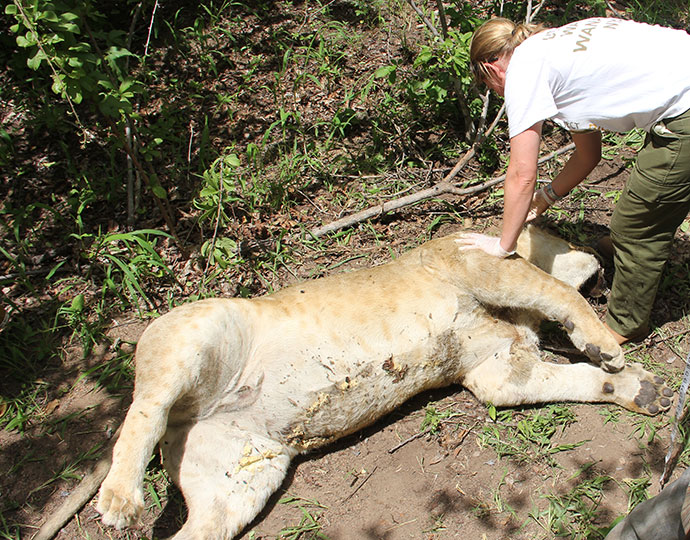Ruaha Carnivore Project
Photo credit: Pietro Luraschi
WHO WE ARE: Ruaha Carnivore Project, Ruaha, Southern Tanzania
WHY WE NEED YOU: To help reduce carnivore killing through community conservation in Tanzania’s Ruaha landscape.
HOW MANY PEOPLE WORK FOR OUR CHARITY: 40
WHERE YOUR MONEY GOES:
- $10 / £7 pays for food for a community meeting
- $10 / £7 pays for one T-shirt for a local conflict monitor
- $25 / £16 pays for one educational DVD night in local villages
- $50 / £33 pays for one livestock guarding dog for one month
- $50 / £33 provides a bike for a community scout
- $100 / £66 pays for one educational Park trip for 8 villages
- $100 / £66 pays for one GPS unit for carnivore tracking
- $150 / £100 buys a digital camera for carnivore sightings
- $200 / £133 pays for fuel for one field vehicle for a month
- $200 / £133 provides subsidised veterinary medicines to one household for a year
- $250 / £166 buys a camera-trap for community camera-trapping
- $350 / £233 pays for predator-proofing one livestock enclosure
- $400 / £266 pays for one RCP assistant for one month
- $500 / £333 pays for a community liaison officer for one month
- $500 / £333 provides schoolbooks for one school for a year
CONTACT US: CLICK HERE TO SEE OUR WEBSITE
Tanzania’s Ruaha landscape supports some of the world’s most important carnivore populations, including over 10% of the world’s lions and globally significant populations of cheetahs, leopards, spotted hyaenas and endangered African wild dogs. These populations range across not only Ruaha National Park, but also adjoining village land, where the local communities are extremely poor, with 90% living on less than $2 per day. Carnivores frequently attack villagers’ livestock, causing them additional hardship – our research found that carnivores cost local people 18% of their annual cash income. In addition to this economic impact, loss of livestock to carnivores also imposes significant social costs in these traditional pastoralist societies.
This conflict has led to the highest recorded rate of lion killing in East Africa in modern times, with many carnivores speared, poisoned and snared by villagers each year. We need your support to help reduce attacks and provide community benefits from carnivore presence, to reduce killing and encourage long-term human-wildlife coexistence in this vital landscape.
The Ruaha Carnivore Project was established in 2009, with the aims of gathering data on carnivore populations for conservation planning, and reducing human-carnivore conflict. We have established extensive grids of camera-traps across the landscape, and worked closely with Park lodges to collect data on carnivore sightings, leading to the first papers on carnivore distribution across Ruaha. We are now working on developing a database of individual carnivore identification, so that we can learn more about carnivore movements, demography and causes of mortality across the landscape. Our carnivore monitoring data are also shared with the Tanzanian authorities for future conservation planning.
The most important aspects of our work is conflict mitigation, however, and our research revealed 3 main drivers of conflict – livestock depredation, a lack of tangible local benefits from conservation, and poor awareness of the role and importance of wildlife conservation. Our team has worked hard to reduce carnivore attacks by predator-proofing livestock enclosures and by starting the first trial of specialised guarding dogs in East Africa. In terms of benefits, the villagers identified education, healthcare and veterinary medicines as their top priorities, so we have developed a school-twinning programme, sponsored secondary-school scholarships, equipped and provided medicines to rural clinics, and provided subsidised veterinary medicines to local households. In addition, we have provided extensive education about wildlife through village DVD nights and visits to the Park, which allow people (often for the first time) to watch and learn about wildlife in a non-threatening way.
The project has had great success over the past 6 years, and now employs over 40 local staff. Depredation has been reduced by over 60% in the core study area, and carnivore killings have declined by 80%, leading to the project’s Director, Dr Amy Dickman, being recognised by Prince William in the prestigious Tusk Conservation Awards. There is now an urgent need to continue this work in the core 5 villages, and to extend it across all 22 villages in the Ruaha landscape, to provide significant, long-term benefits for both people and predators.













